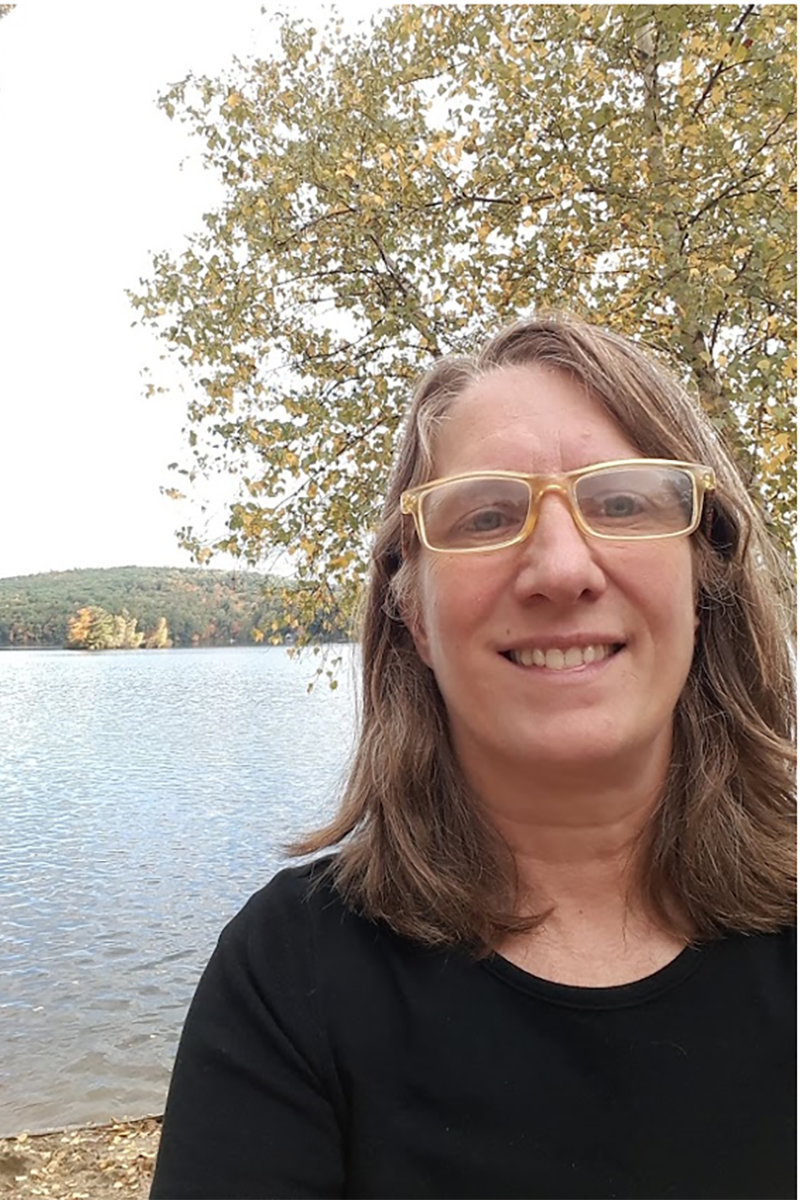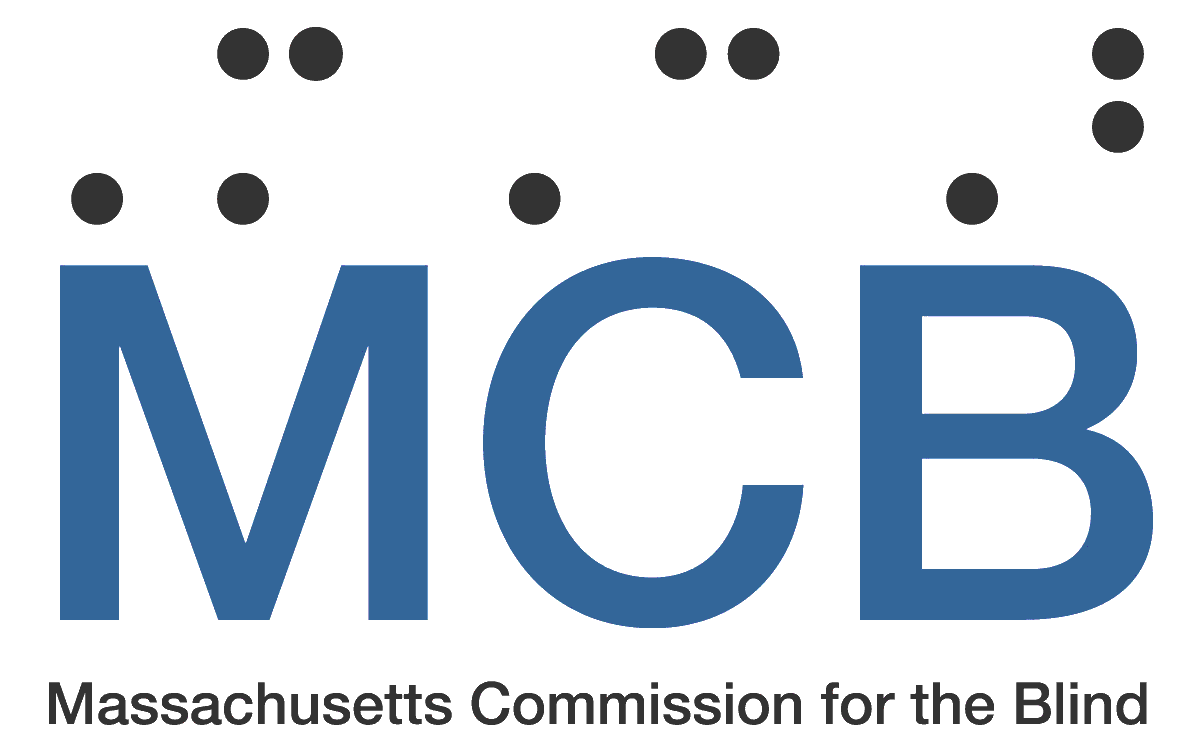- Massachusetts Commission for the Blind

By Jackson Crilley
DeafBlind Awareness Week Story Series Staff Spotlight: Christine Dwyer
Christine Dwyer is a DeafBlind Extended Supports (DBES) Rehabilitation Counselor who has been with MCB for about two years. In her position, Christine provides services to consumers who are DeafBlind and/or legally blind with cognitive issues toward their goals.
Can you tell me a bit more about yourself?
I am a mom, I have two adult sons, so you know that's part of who I am, trying to help them navigate the world. Just going back, when I was very young is when I met my first friend with a “disability,” I don't think about it as a dis-ability. I was four and she was three, and we met in the sandbox. She was hard of hearing and wore this big hearing aid as they did back in the 60's in a harness that was worn across the chest. I thought that was the most fascinating thing I had ever seen. We're still friends today and stay in touch. She has rubella syndrome, which is something that a lot of the population I'm working with even now with MCB born back in the 60's have. I have learned a lot about folks with that specific syndrome and how varied it can be for them. I feel like that's helped me a lot in my job now at MCB.
I went on to learn more about Deaf and hard-of-hearing people. I went to work and volunteered as a summer camp counselor for Deaf and children of Deaf adults (CODA). I just kind of dove in and felt like if you want to learn to work with people, you must learn their culture, and that was how I learned theirs.
Since 1982, I've been a certified American Sign Language (ASL) interpreter. In 1984, I stepped on campus at Perkins School for the Blind and I worked there until 2020 when I came to MCB.
So much of what I know is from my time at Perkins working with the professionals, and especially my students. I started in direct care and then I worked in the school building where I used more of my interpreting skills. I assisted students who attended classes across campus and at other schools. It was great to see some of these students go on to college. I stay in touch with a couple of them and I’m proud of their achievements.
What is your favorite part of the work you do?
I love being with the consumers one-on-one. I really enjoy being able to have direct communication with my consumers who use sign language, which I find really valuable in establishing rapport. Because I was at Perkins for so long, I see a lot of my former students on my caseload now and it's so wonderful to see how well they've done, where they are, and get reinvolved with them.
Are there any moments in your career (with MCB or in any previous positions) that have stuck with you?
The one thing I think that stuck with me was my time in the communications department at Perkins. I worked with a spokesperson who is DeafBlind and for about 15 years we did a lot of presentations to all kinds of groups, including preschoolers, Lions Clubs, and college groups. We spoke with various groups about how people who are blind or DeafBlind really aren't that different. We have the same wants, needs, places that we want to go in life, and activities that we want to do. Being DeafBlind just means that person may need to do it a little bit differently.
It was rewarding for me when I met with people who are not DeafBlind, alongside a DeafBlind person, to help share information that would break down barriers and misconceptions. For example, Jaimi Lard and I even did a TedTalk together, The Courage To Be Inclusive, at the JFK Museum as part of TedX Beacon Street in 2018. That was really cool, and I think that was a highlight for the both of us.
There are just so many different moments that come into my mind, like working with my students when they were struggling and then they get that "Aha!" moment and overcome some obstacle. It is truly rewarding to watch them have that confidence to keep going forward. For example, I worked with a student who was a dishwasher at a summer camp. He had never learned a language until he was 18. When I met him at the camp, he kept saying in sign language, "Water hot" and I was unsure what he was referring to. Later, we sat with a group of people by a pond and a firepit. My student signed “water hot.” It was at that time that I realized that he was trying to communicate that he had previously sat with this group at this location. This helped me to remember to be open-minded about what someone is trying to communicate.
Are there any goals that you have for your work with MCB?
My goal at MCB is to make sure all of my consumers have the supports they need so they can be as independent as possible. This is such a range in the population of the DeafBlind Extended Supports Unit. I have some folks who are in their own apartments and other folks who need 24/7 staff care.
If you could give anyone considering a role working with DeafBlind individuals any advice, what would it be?
I'd tell them to first get involved with the DeafBlind community. Get to know them and build trust. If they don't trust you, it's not going to go well. They need to know that you're invested in that community and that you're invested in what you're doing with them and that you want to be a part of it. Also learning all the multiple ways of communication as there are many different ways to communicate with DeafBlind people. There's tactile ASL (hand over hand feeling sign language); there are people who have retinitis pigmentosa who are deaf so they're losing their field of vision, so you have to sign in a smaller space, so it fits in their visual field. There is also print on palm which can include other languages. One student I worked with did not speak English when they first arrived at Perkins and did print on palm in their home language until they learned more English and Braille, and then ASL.
There's tracking where the DeafBlind person is holding someone's wrist to track visually, Pro-Tactile communication, and there's haptics where you're touching someone to give them feedback, like smiling by drawing a smile face on their shoulder or tapping them to let them know you're engaged in that conversation. I think knowing those things helps let the DeafBlind people trust you, that you're invested, and you understand there's a range of communication modes.
As a DBES counselor, what does DeafBlind Awareness Week mean to you and the consumers you work with?
For me, Helen Keller's story has influenced me to do what I do. I remember watching The Miracle Worker when I was younger and thinking to myself, "That's what I want to do; I want to work with people who are DeafBlind. That's fascinating." I feel fortunate that at a young age I knew what I wanted to do and after that I just kept learning. For the DeafBlind folks, I think it means a lot of different things. Certainly, having non-DeafBlind people more aware of the fact that there are people with combined vision and hearing loss pretty much everywhere and they want to be included like everyone else. So DeafBlind Awareness Week highlights that and gives opportunities for people to learn that DeafBlind people aren't so different. They aren't all Helen Keller and that they have different things that they can offer. I think people are limited to The Miracle Worker and kind of feel like that story ends when Helen learns "water.” But Helen's life goes on so much further with activism and advocacy. We have MCB because of Helen Keller.
Besides Helen Keller, are there any other DeafBlind role models that you have?
I would say many of my students like Bapin Bhattacharyya, Eddie Martinez, and Jaimi Lard, to name only a few. There are just so many! There are a lot of DeafBlind leaders who I have met from around the country, and I admire all their work to improve the lives of anyone who is DeafBlind.
